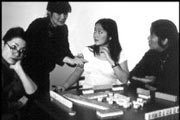THE CHALLENGE IN adapting a book for the stage or film is that people can read at home for free; a production has to create a more visually compelling way of depicting what you could otherwise enjoy from the comfort of a La-Z-Boy with your cat and a cup of tea. The Repertory Actors Theatre falls into the literary trap almost immediately with its world premiere of Amy Tan’s best-selling tearjerker The Joy Luck Club (playing through Sunday, Feb. 9), in which four Chinese women and their daughters living in San Francisco reveal the secrets of their regret-laden pasts.
Adapter/director David Hsieh’s evening begins with actors reeling off narrative monologues to the audience while silent others pantomime what is being said, and that’s pretty much how it stays. The book’s predictable rhythm doesn’t help: If you’re underwhelmed after one mother walks into the spotlight and tells the story of her heartbreak, you can’t help but look over to the other ladies at the mah-jongg table and think, There’s three more where that came from. Hsieh leans too heavily on the repetitive monologue format—not until Act II are there scenes of any note in which people talk to one another, by which time the idea of actual dialogue seems like a revelation.
He should’ve taken a good look at how Book-It Theatre meets similar page-to-stage challenges. That company’s shared or overlapping narration, its transformation of exposition passages into ironic dialogue, and the choreographic energy of its blocking is much needed and entirely missing here. There’s little of the hum and shuffle of life. Even potential powerhouse bits become missed opportunities. The sight of a furiously oppressed wife drowning her own baby lacks the terrifying, methodical stillness it should possess because it isn’t given the weight of the words—overlooked and underlit, it seems nothing more than a moment that just doesn’t happen to have a soundtrack. It’s over two-thirds into the nearly three-hour show before we get a bit of stagecraft outside of pantomimed silhouettes: billowing fabric as ocean waves, a lovely old trick that still works, even if it’s too little too late.
Some of the acting here is capable, and, yes, some of it is not, but not a moment of it is disingenuous, for which Hsieh’s inclusive earnestness must be given credit. The sight of the sprawling, multigenerational Asian ensemble is moving in itself, and it’s a rewarding surprise that two of its youngest members, Masumi Hayashi-Smith and Casey Floresca, perform so well as the childhood versions of two of the older protagonists (among them, Shirley Oliver’s puffed-up mother Lindo is the highlight). But the play’s climactic family picture doesn’t finally mean anything because we haven’t really seen who they are. All we know is what we’ve been told.









